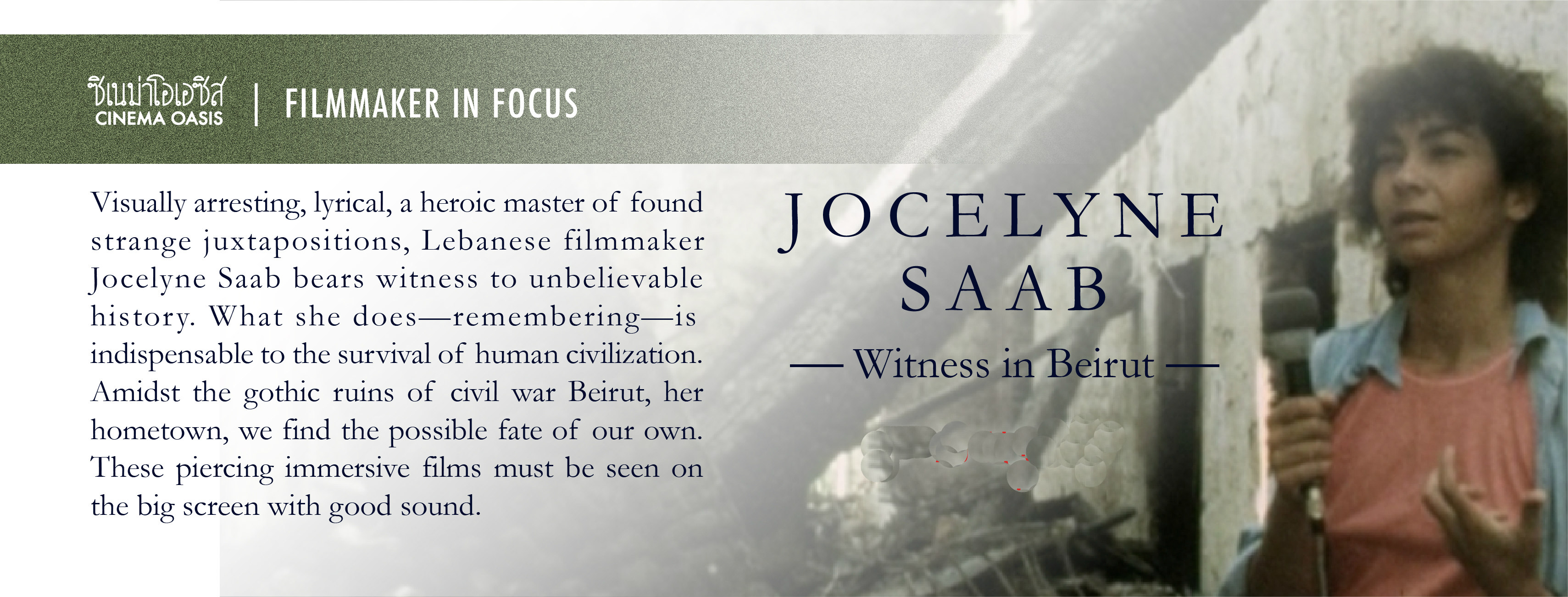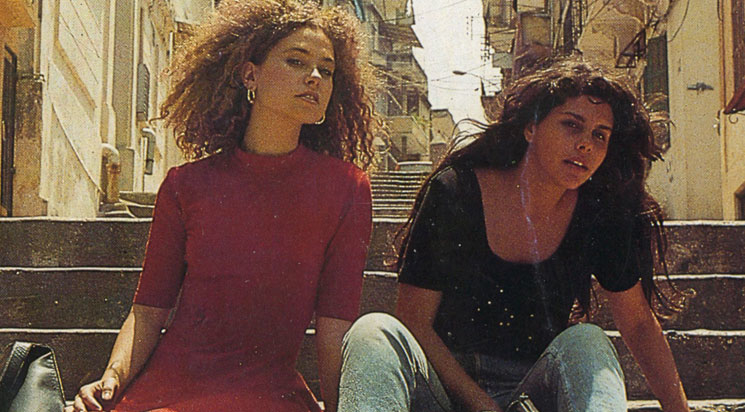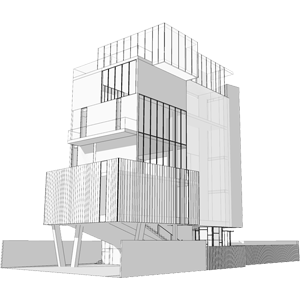Once Upon a Time in Beirut

—In loving memory of Director Jocelyne Saab—
Filmmaker in Focus :
Jocelyne Saab : Witness in Beirut
Visually arresting, lyrical, a heroic master of found strange juxtapositions, Lebanese filmmaker Jocelyne Saab bears witness to unbelievable history. What she does—remembering—is indispensable to the survival of human civilization. Amidst the gothic ruins of civil war Beirut, her hometown, we find the possible fate of our own. These piercing immersive films must be seen on the big screen with good sound.

Once Upon a Time in Beirut
Lebanon/1994/ 100 min/digitized 35 mm/ Color, B&W
In English, Arabic, French with English subtitles
A dusty red Mercedes sedan careens through the haunted devastation of Beirut, almost crashing into a wounded man in a wheelchair; inside 2 girls, a Muslim and a Christian, both born in wartime, who have never known peace & normalcy, joke about their blindfolds & kidnapping: it’s all a lark to them. Diving into the mysterious Mr Faroukh’s cinematic treasure trove, Leila and Yasmine trip through magical old films, foreign and domestic that, pieced together, tell the history of Lebanon. A smug French voice says in an old propaganda black and white film celebrating the arrival of the French Commissioner in the Druze mountains: “We are at home in these far-flung lands, by virtue of a moral right that dates from the Crusades, consecrated by a League of Nations mandate.. The wild warriors on all sides, who have always fought each other, are now reconciled & live under our flag and protection.”
This is followed by a wonderful scene from an early talkie romance, as a Christian girl prepares to run off with a Muslim man. “You should know that your whole life is being decided right now. I’ll give you my whole future, but I will also take your whole existence,” the man tells his intended bride, “You will have to give up your past and your traditions, which are maybe very dear to you.” At her consent, he seals the deal: “Now, Yamile, you are my fiancée, I no longer have the right to look at you until our wedding day,” he says, bringing her veil down over her face, hiding its beauty forever from the world.
As war looms a beautiful woman in a white shirt strolls through a cedar forest, beaming with the joy of it all. “Lebanon, land of beauty, creation of God, paradise on earth,” she sings in an unearthly voice. Into the 60’s as David Niven as Dr Love watches his plane to Beirut blow up minutes after he switched from it. “Beirut is a very small place,” says a scary cop at Beirut airport in another movie, “Sit down by the river bank and wait. Sooner or later you’ll see your enemy’s body go by. Your friends’ too, of course.”
It’s 1967, “the beginning of our Vietnam,” a guitar-strumming young man sings in an old house as the hippie Leila and Yasmine listen, “Israel is in our sky.” A seer divines the girls’ future by scaring some doves into flight with a black flag; they fly in a circle over the wrecked rooftops of Beirut. But even these piercing moments pale when we are confronted with a stark drive through the empty wreckage of a city accursed by colonial aggression and civil war, by greed and hatred. The film is an immersive experience; must see on big screen with good sound.
Director: Jocelyne Saab
Script: Philippe Paringaux, Roland Paringaux, Jocelyne Saab
Photography: Roby Breidi Sound: Pierre Bouvier-Donnadieu, Jean-Pierre Delorme
Editing: Dominique Auvray, Isabelle Dedieu Cast: Michele Tyan, Myrna Maakaron, Emile Accar
Production Companies: Balcon Production, France; Hessicher Rundfunk Arte; Arte Strazbourg; Aleph Production, Beirut
Jocelyne Saab : Born in Beirut, 1948. Receiving attention with her first feature-length documentary, Lebanon in Turmoil (1975), she also released works about Iran, the Polisario Front of Western Sahara, and Vietnam. While making her Beirut trilogy, she simultaneously worked for Volker Schlöndorff’s Circle of Deceit (1981) as assistant director. Her major works include her first narrative film, Suspended Life (1985); Once Upon a Time in Beirut (1994), dedicated to the anniversary of a century of cinema and the founding of the Lebanese cinematheque; and Dunia (2005). In recent years, her photo installations and her art film What’s Going On (2010) were acclaimed internationally. Saab also founded the organization Cultural Resistance, and in 2013, she became the organizer and curator of the Tripoli Film Festival, Lebanon’s first film festival featuring films of Asia and the Mediterranean area.
| Date | time |
|---|---|
| Fri 31 Jan | 14:00 |





